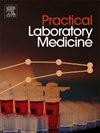Anti-IH in myelodysplastic syndrome
IF 1.7
Q3 MEDICAL LABORATORY TECHNOLOGY
引用次数: 0
Abstract
Background
Anti-IH exhibits complex specificity, strongly reacting with cells expressing both H and I antigens at cold temperatures. Its clinical significance has been increasingly recognized, particularly in patients with hematologic conditions such as myelodysplastic syndrome (MDS) and chronic myelomonocytic leukemia (CMML).
Case report
We present an 83-year-old Thai female with MDS who was transfusion-dependent. She presented with severe anemia requiring an urgent transfusion. The patient was group A RhD-positive. Antibody screening and identification using column agglutination technology (CAT) showed weak polyagglutination. Auto-control and direct antiglobulin tests (DAT) were negative. Red cell typing showed absence of H antigen and presence of A1 antigen. Further testing with cord O cells revealed no agglutination, confirming the A1 blood group with anti-IH. Antibody screening and identification studies showed cold-reactivity, with weak reactivity at 37 °C and in the AHG phase. Crossmatching with two group A leukocyte-poor red cells was compatible, and transfusion was uneventful.
Conclusion
This is the first reported case of anti-IH in a Thai patient. Anti-IH may complicate pre-transfusion testing and mask alloantibodies, necessitating careful interpretation and confirmatory testing to prevent transfusion-related complications.
骨髓增生异常综合征的抗ih
抗ih具有复杂的特异性,在低温下与表达H和I抗原的细胞发生强烈反应。其临床意义已被越来越多地认识到,特别是在血液病患者,如骨髓增生异常综合征(MDS)和慢性髓细胞白血病(CMML)。病例报告:我们报告一位83岁的泰国女性MDS患者,她依赖输血。她表现出严重贫血需要紧急输血。患者为A组rhd阳性。利用柱凝集技术(CAT)进行抗体筛选和鉴定,结果显示抗体存在弱的多凝集现象。自动控制和直接抗球蛋白试验(DAT)均为阴性。红细胞分型显示H抗原缺失,A1抗原存在。脐带O细胞进一步检测未发现凝集,证实A1血型具有抗ih。抗体筛选和鉴定研究显示冷反应性,在37°C和AHG期具有弱反应性。与两个A组白细胞缺乏的红细胞交叉配型是相容的,输血是平稳的。结论这是泰国首次报道的抗ih病例。抗ih可能使输血前检测和屏蔽同种异体抗体复杂化,需要仔细解释和确认性检测,以防止输血相关并发症。
本文章由计算机程序翻译,如有差异,请以英文原文为准。
求助全文
约1分钟内获得全文
求助全文
来源期刊

Practical Laboratory Medicine
Health Professions-Radiological and Ultrasound Technology
CiteScore
3.50
自引率
0.00%
发文量
40
审稿时长
7 weeks
期刊介绍:
Practical Laboratory Medicine is a high-quality, peer-reviewed, international open-access journal publishing original research, new methods and critical evaluations, case reports and short papers in the fields of clinical chemistry and laboratory medicine. The objective of the journal is to provide practical information of immediate relevance to workers in clinical laboratories. The primary scope of the journal covers clinical chemistry, hematology, molecular biology and genetics relevant to laboratory medicine, microbiology, immunology, therapeutic drug monitoring and toxicology, laboratory management and informatics. We welcome papers which describe critical evaluations of biomarkers and their role in the diagnosis and treatment of clinically significant disease, validation of commercial and in-house IVD methods, method comparisons, interference reports, the development of new reagents and reference materials, reference range studies and regulatory compliance reports. Manuscripts describing the development of new methods applicable to laboratory medicine (including point-of-care testing) are particularly encouraged, even if preliminary or small scale.
 求助内容:
求助内容: 应助结果提醒方式:
应助结果提醒方式:


